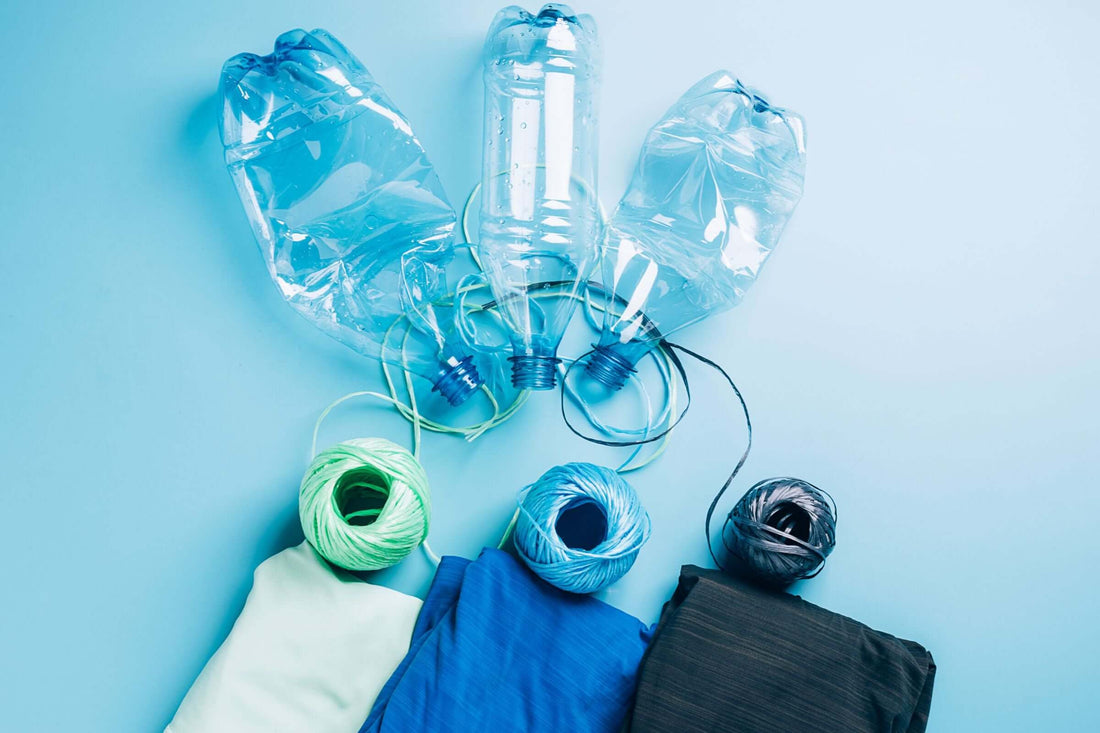
Dive into Sustainability: What is Recycled Polyester (rPET) Fabric?
Share
Eco-Friendly Scuba Diving Fashion: What is Recycled rPET Fabric, how is it made, and what is the impact?
If you're passionate about cleaning up our planet and protecting our freshwater & marine ecosystems, this blog post is for you!
There have been a lot of headlines over the years about plastic waste ending up in our oceans and impacting the animals and ecosystems we love. If we don't start to make some changes, the World Economic Forum forecasts there will be more plastic than fish in our oceans by 2050. That is horrifying!!
As scuba divers, many of us are already early change makers eager to help protect the things we love (& love to dive in):
- Maybe you've already made the switch to reusable shopping bags? (We have some fun organic cotton tote bags!)
- Maybe you're also already trying to reduce other single use plastics from your daily life, like: food storage bags & containers, straws, plastic cups, laundry detergent bottles, & more...)
- And since you found us here @The Lake Shark, we're guessing that you're also starting to consider the type of businesses you support & trying to shop 'small' with smaller local businesses with sustainable & eco-friendly practices ❤️
- So what else can make an impact? Have you thought about what goes into the clothes, swimwear, & dive rashies you wear? We have some updates to share about old vs. new & more eco fabric options!
Let's dive into one of the creative ways The Lake Shark is helping to make a difference - by using Recycled material fabrics like rPET to help keep materials already created OUT of landfills & our oceans.
First, let's learn a little bit about the fabric used in "the old way"...
Traditional Polyester:
Historically most swimwear and activewear brands have used traditional polyester fabric because it is: Durable, Comfortable, Dries quickly, & is Resistant to harmful UV from the sun.
While those features are all great, unfortunately this traditional swimwear material also comes at a high cost to the environment. Not just in creating it, but also the missed opportunity to reuse and repurpose some of the ingredients & materials that already exist - and are going to waste.

That's where new innovative Recycled Polyester (rPET) comes in as a more eco-friendly option! Let's break down the details:
What is rPET?
Recycled polyester, also known as rPET, is a more sustainable alternative to traditional polyester fabric.
rPET has all the good features of traditional polyester, but the fabric is actually made from recycled plastic bottles! Yep, you heard that right – those plastic bottles from beach clean-ups and home recycling efforts can be repurposed and transformed into high-quality, soft, stylish and eco-friendly fabric!
Using recycled materials instead of virgin also produces fewer carbon emissions and helps protect natural resources.
This is a ray of hope that we needed!
How is rPET made?
The process of creating rPET starts with collecting and sorting used plastic bottles. These bottles are carefully cleaned, shredded into small pieces, crushed and melted down to form a liquid. Then the liquid is spun into fibers and eventually woven into fabric.
The end result is a clean, durable, and unbelievably SOFT performance fabric that's not only stylish but also has a positive impact on the environment!
What impact do you make by supporting a brand (like The Lake Shark) that uses high-quality eco-friendly fabric in our scuba diving & activewear collections?
You will contribute to:- Helping to clean up our planet
- Reducing the amount of plastic waste that ends up in our oceans and landfills.
- Conserving valuable resources
- Reducing our carbon footprint
- Adding an extra layer of eco-conscious goodness to your underwater explorations!
That sounds great! Are there any downsides to using sustainable materials like rPET?
Let's get real - Using recycled materials and ensuring an ethical supply chain are decisions that cost more and it also means it takes more time to make our products, vs. traditional methods.
But we strongly believe in the importance of making a difference -- and hope you also think it's worth it to help find ways to keep plastics that have already been created from continuing to end up in landfills, our local waterways, or the sea.
We want you to look good AND feel good about helping to contribute a positive impact for the planet!
Finding ways to reuse, repurpose, and give new life to materials already created - and using them to help get more people outfitted, in a more sustainable way - means we can help get more happy awesome scuba divers into the wild to actively learn about, experience, and protect our local ecosystems and beyond... And that is WINNING in our book!
 Checkout some of our latest products made with eco-friendly Recycled Polyester rPET fabric:
Checkout some of our latest products made with eco-friendly Recycled Polyester rPET fabric:
Women's Crop-Top Rash Guards (available in sizes XXS - 6XL)
Women's Premium Leggings with High-Waist Contour and Pockets (available in sizes XXS - 6XL)
Thank you for supporting our small business sustainability goals!
Together we can help clean up & protect our oceans, support marine ecosystem health, and dive into a brighter, more sustainable future.
Dive sustainably,
Cat
Founder & Designer-in-Chief of The Lake Shark LLC
www.TheLakeShark.com




